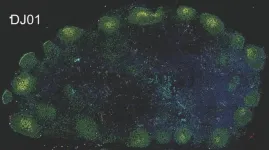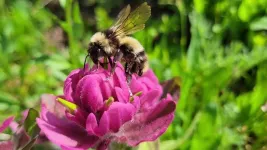(Press-News.org) Kiwifruit has proven itself as a powerful mood booster and new research from the University of Otago has shown just how fast its effects can be.
In a study, published in The British Journal of Nutrition, researchers found the furry fruit improved vitality and mood in as little as four days.
Co-author Professor Tamlin Conner, of the Department of Psychology, says the findings provide a tangible and accessible way for people to support their mental well-being.
“It’s great for people to know that small changes in their diet, like adding kiwifruit, could make a difference in how they feel every day.”
Vitamin C intake has been associated with improved mood, vitality, well-being, and lower depression, while vitamin C deficiency is associated with higher depression and cognitive impairment.
However, Professor Conner says limited research has assessed how quickly mood improvements occur after introducing vitamin C supplements or whole food sources.
The researchers aimed to fill that gap with an 8-week dietary intervention of 155 adults with low vitamin C.
Participants took daily either a vitamin C supplement, placebo, or two kiwifruit. They then reported their vitality, mood, flourishing, sleep quality, sleep quantity, and physical activity using smartphone surveys.
The researchers found kiwifruit supplementation improved vitality and mood within four days, peaking around 14-16 days, and improved flourishing from day 14. Vitamin C, on the other hand, marginally improved mood until day 12.
Lead author Dr Ben Fletcher, who conducted the research as part of his PhD at Otago, says understanding the nuances of when and how these effects occur day-to-day contributes to our knowledge of the potential benefits of vitamin C-rich foods and supplements on mental health.
“This helps us see that what we eat can have a relatively fast impact on how we feel.
“Our participants had relatively good mental health to begin with so had little room for improvement, but still reported the benefits of kiwifruit or vitamin C interventions,” he says.
He adds that, while vitamin C tablets showed some improvements, the study underscores the potential synergistic effects of consuming whole foods like kiwifruit.
“We encourage a holistic approach to nutrition and well-being, incorporating various nutrient-rich foods into your diet.”
In addition to the direct implications for individuals seeking to improve their mental well-being, Professor Conner says the study introduces a novel methodology in nutritional research.
“The use of intensive smartphone surveys offers a real-time understanding of the day-to-day changes in mood-related outcomes.”
END
Furry fruit improves mental health – fast
2024-01-25
ELSE PRESS RELEASES FROM THIS DATE:
Women and people of color remain “invisible” as most people pick white men as their heroes, study shows
2024-01-24
Women and people of colour remain invisible to many people in Britain and the USA as people pick white men as their heroes instead, a study shows. Their achievements are often forgotten or not recognised when people are choosing who inspires them, researchers have found.
Most people said their family and friends, people closest to them, were their heroes. These ‘everyday’ heroes accounted for one in three choices in Britian and 41 per cent in the US.
In both countries, politicians were popular as heroes, with more common choices including Ronald Reagan, Abraham Lincoln, ...
Texas Biomed researchers pinpoint most likely source of HIV rebound infection
2024-01-24
In findings that have implications for potential new HIV therapies, researchers from Texas Biomedical Research Institute (Texas Biomed) used genetic sequencing techniques on the nonhuman primate version of the virus to identify that lymph nodes in the abdomen are the leading source of rebound infection after the first week of stopping antiretroviral treatment.
The study regarding simian immunodeficiency virus (SIV) was reported in the journal Science Translational Medicine. SIV is very closely related to HIV and is commonly used as a proxy to study HIV in animal models.
“Lymphoid tissues are known to be large ...
Microplastics may be accumulating rapidly in endangered Galápagos penguins’ food web
2024-01-24
Microplastics, with a size from 1 micron to < 5 millimeters, are pervasive pollutants that have been found in all parts of the global ocean, and have made their way into the marine food webs. Researchers, led by University of British Columbia UBC’s Institute for the Oceans and Fisheries scientists and Ecuadorian researchers from Galápagos and the ESPOL Polytechnic School (Guayaquil, Ecuador), looked closely at how microplastic bioaccumulation was affecting the endangered Galápagos penguin (Spheniscus mendiculus) as an indicator species to trace how deeply microplastic bioaccumulation has entered the food web in the isolated Galápagos Islands.
An ...
The more the merrier: Research shows online interventions with social support help middle-aged adults with obesity lose weight
2024-01-24
Obesity is a problem in the United States. In fact, 42.5% of U.S. adults aged 20 and over have the disease. Not only is obesity the nation’s second leading cause of preventable death (behind only smoking cigarettes), it also leads to other serious health issues, including an increased risk of type 2 diabetes, high blood pressure, heart disease, stroke, cancer, sleep apnea and liver disease. The disease and its side effects impose a significant financial burden on America’s health care system.
As many make — and often fail to keep — New Year’s resolutions about exercise and weight loss goals, University ...
Salk Institute Professor Ronald Evans honored with Japan Prize
2024-01-24
LA JOLLA (January 22, 2024)—Salk Professor Ronald Evans has been named the 2024 recipient of the Japan Prize in the field of Medical Science and Pharmaceutical Science. The Japan Prize Foundation awards this prestigious international award annually to “express Japan’s gratitude to international society.”
"I am delighted to extend my congratulations to Ron for this well-deserved recognition in honor of his discovery of nuclear hormone receptors,” says Salk President Gerald Joyce. “This accomplishment not only reflects the exceptional caliber of Ron’s research ...
How does HIV get into the cell’s centre to kickstart infection?
2024-01-24
UNSW medical researcher Dr David Jacques and his team have discovered how the human immunodeficiency virus (HIV) breaches the cell nucleus to establish infection, a finding that has implications beyond HIV biology.
To infect cells, HIV must enter the target cell and make its way to the nucleus in the cell’s centre where enough copies of its genetic code can be produced to infect other cells.
To safely complete this quest, the virus builds a protective protein coat – a capsid – to shield itself from the host’s immune defences geared to destroy it. Until ...
One in five Colorado bumblebees are endangered, new report says
2024-01-24
On a cliffside at Mesa Verde National Park in southern Colorado, a fuzzy bee was industriously gnawing at the red sandstone. Making a loud grinding sound, the insect used its powerful jaws to drill tunnels and holes in rocks, where it would build a nest for raising offspring.
The bee, known as Anthophora pueblo, is a type of digger bee native to Colorado. Discovered less than a decade ago, the bee has quickly become Adrian Carper’s favorite pollinator.
“This is just one example of how crazily diverse our native bees are,” said Carper, an ...
Mayo Clinic study explores heart failure, uncovers gene’s role in recovery
2024-01-24
Mayo Clinic researchers studying the genetics of people who had recently developed dilated cardiomyopathy, one of the most common causes of heart failure, have found a particular gene to target for developing future drug therapy treatments. The disease makes it harder for the heart's left ventricle to pump blood effectively to the rest of the body. In this first genome-wide association study, the researchers sought to understand why some patients get better after developing the condition — and some don't.
"We found genetic variation in the CDCP1 gene, a gene that no one has heard of in ...
How studying defensive bacteria may help human gut health
2024-01-24
MSU has a satellite uplink/LTN TV studio and Comrex line for radio interviews upon request.
Images
EAST LANSING, Mich. – Thousands of types of bacteria live in the human gut. They help digest the food we eat and absorb nutrients, but these bacteria don’t just do this to be kind to humans, there is a benefit for them too.
Elizabeth Heath-Heckman, an assistant professor in the College of Natural Science, has received a five-year National Institutes of Health grant from the National Institute for General Medical Sciences totaling $1.9 million to support her research studying ...
Study: This protein may be the ‘glue’ that helps COVID virus stick
2024-01-24
When SARS-CoV-2 enters the human body, the virus’ spike protein binds to a cell, allowing the virus to infiltrate and begin replicating.
A new study from Tulane University, conducted in partnership with Florida International University and published in Protein Science, has identified a protein that may be the glue that helps COVID’s spike protein stick.
The study found that a small piece of a proteoglycan called perlecan LG3 – a protein most commonly found in blood vessels and the brain – ...




